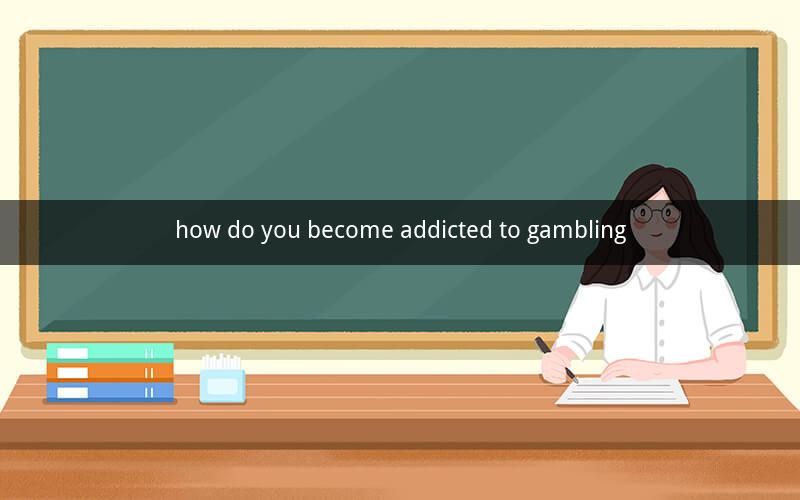
How Do You Become Addicted to Gambling?
Table of Contents
1. Understanding Gambling Addiction
2. The Signs of a Gambling Problem
3. Factors That Contribute to Gambling Addiction
4. The Psychological Aspects of Gambling Addiction
5. The Physical Symptoms of Gambling Addiction
6. The Social and Financial Consequences of Gambling Addiction
7. How to Identify and Treat Gambling Addiction
8. Support Systems for Overcoming Gambling Addiction
9. Preventive Measures to Avoid Gambling Addiction
10. Case Studies and Personal Stories
1. Understanding Gambling Addiction
Gambling addiction, also known as gambling disorder, is a behavioral addiction characterized by an irresistible urge to gamble, despite the negative consequences. It is important to recognize that gambling addiction is a real and serious condition that can affect individuals of all ages, backgrounds, and socioeconomic statuses.
2. The Signs of a Gambling Problem
Identifying the signs of a gambling problem is crucial in seeking help. Common signs include:
- Spending increasing amounts of time and money on gambling activities.
- Feeling restless or irritable when not gambling.
- Making repeated unsuccessful efforts to cut down or stop gambling.
- Continuously chasing losses in an attempt to win back money.
- Lying to family, friends, or therapists about the extent of gambling activities.
- Risking significant relationships, careers, or education due to gambling.
3. Factors That Contribute to Gambling Addiction
Several factors can contribute to the development of a gambling addiction:
- Personality traits: Individuals with low self-esteem, high impulsivity, and a need for excitement may be more susceptible to gambling addiction.
- Environmental factors: Easy access to casinos, online gambling platforms, and exposure to gambling advertisements can increase the risk.
- Genetic factors: Research suggests that there may be a genetic predisposition to gambling addiction.
- Psychological factors: Stress, anxiety, and depression can trigger gambling as a form of self-medication.
4. The Psychological Aspects of Gambling Addiction
Gambling addiction is closely linked to the brain's reward system. When individuals engage in gambling activities, the brain releases dopamine, a neurotransmitter associated with pleasure and reward. Over time, the brain becomes accustomed to the release of dopamine, leading to increased tolerance and a stronger desire to gamble.
5. The Physical Symptoms of Gambling Addiction
While physical symptoms are less common in gambling addiction, some individuals may experience:
- Insomnia
- Loss of appetite
- Weight fluctuations
- Nervousness
- Tremors
6. The Social and Financial Consequences of Gambling Addiction
Gambling addiction can have severe social and financial consequences:
- Strained relationships with family and friends
- Financial ruin, including debt and bankruptcy
- Legal problems, such as theft or fraud
- Job loss and career setbacks
7. How to Identify and Treat Gambling Addiction
Identifying gambling addiction often requires self-reflection and acknowledging the negative impact of gambling activities. Treatment options may include:
- Therapy: Cognitive-behavioral therapy (CBT) and other forms of therapy can help individuals understand and change their gambling behaviors.
- Support groups: Joining support groups like Gamblers Anonymous can provide peer support and guidance.
- Medication: In some cases, medication may be prescribed to help manage co-occurring mental health disorders.
8. Support Systems for Overcoming Gambling Addiction
Overcoming gambling addiction requires a strong support system. This can include:
- Family and friends: Encouraging loved ones to be supportive and understanding can make a significant difference.
- Therapists: Professional therapists can provide guidance and support throughout the recovery process.
- Support groups: Joining support groups can offer a sense of community and shared experiences.
9. Preventive Measures to Avoid Gambling Addiction
To prevent gambling addiction, consider the following measures:
- Set strict limits on gambling activities and stick to them.
- Avoid places and situations that may trigger gambling urges.
- Seek help early if you suspect a gambling problem.
- Educate yourself and others about the risks and consequences of gambling addiction.
10. Case Studies and Personal Stories
[Case Study 1: John's Journey to Recovery]
[Case Study 2: Sarah's Struggle and Support]
Questions and Answers
1. What is the difference between problem gambling and gambling addiction?
- Problem gambling is characterized by problematic gambling behaviors that cause distress or harm, while gambling addiction is a more severe form of problem gambling, where the individual is unable to control their gambling behavior despite negative consequences.
2. Can anyone become addicted to gambling?
- Yes, anyone can become addicted to gambling, regardless of age, gender, or socioeconomic status.
3. How can you tell if someone has a gambling addiction?
- Signs of a gambling addiction include spending increasing amounts of time and money on gambling, lying about gambling activities, and experiencing negative consequences due to gambling.
4. Are there any effective treatments for gambling addiction?
- Yes, effective treatments for gambling addiction include therapy, support groups, and medication, depending on the individual's needs.
5. Can gambling addiction be cured?
- While gambling addiction cannot be completely cured, it can be managed and controlled through treatment and support.
6. How can you prevent gambling addiction?
- Preventing gambling addiction involves setting limits, avoiding triggering environments, and seeking help early if you suspect a problem.
7. Is there a genetic predisposition to gambling addiction?
- Yes, research suggests that there may be a genetic predisposition to gambling addiction.
8. Can stress and anxiety trigger gambling addiction?
- Yes, stress and anxiety can trigger gambling addiction, as individuals may turn to gambling as a form of self-medication.
9. How can family and friends support someone with a gambling addiction?
- Family and friends can support someone with a gambling addiction by being understanding, encouraging them to seek help, and providing emotional support.
10. What is the most important step in overcoming gambling addiction?
- The most important step in overcoming gambling addiction is recognizing that there is a problem and taking the initiative to seek help and support.